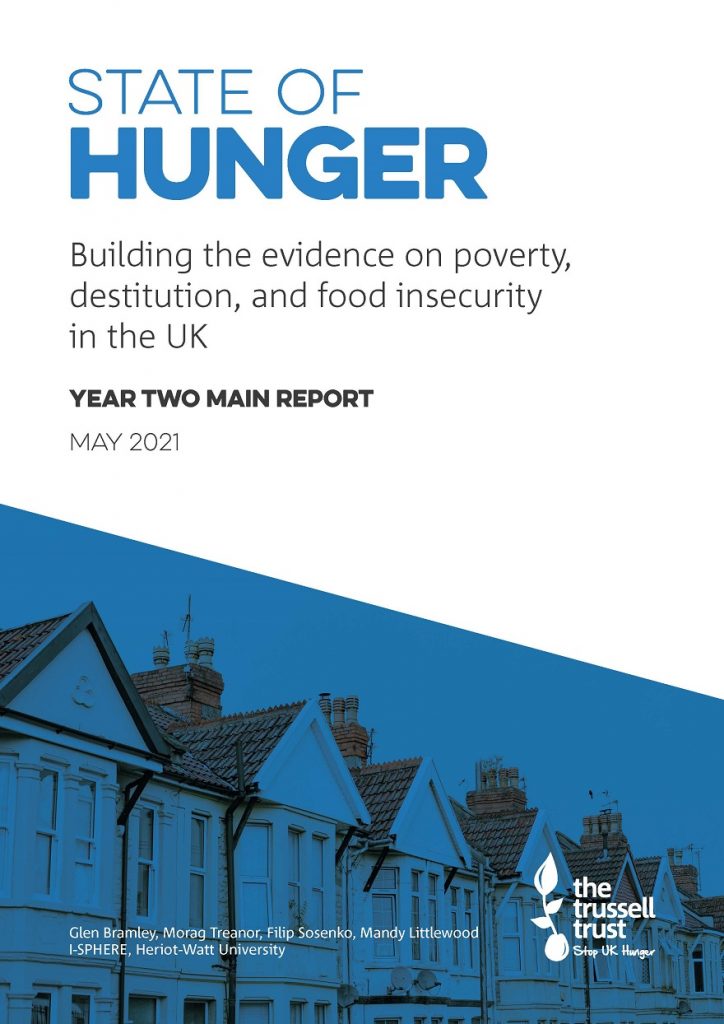13 May 2021

New research released today sheds light on the groups of people across the UK who are disproportionately affected by hunger as well as the key drivers behind food bank use. Commissioned by the Trussell Trust and conducted by Heriot-Watt University, State of Hunger 2021 is the largest study of hunger in the UK to date. Almost two in three (62%) of the people of working age who were referred to a food bank in early 2020 were disabled while single parent families were more likely to be forced to a food bank. Almost one in five (18%) households referred during the pandemic were lone parents – more than twice the rate in the general population (8%).
The research from the Institute for Social Policy, Housing, Equalities Research (I-SPHERE) which was led by Professor Glen Bramley also revealed extremely low income as a key factor in driving people to food banks.
In early 2020, the average monthly household income after housing costs for people who needed to use a food bank was £248 on average, or £8 a day for a couple without children. This needs to cover energy and water costs, council tax, food, and other essentials and is just 13% of the average national income.
In early 2020, 95% of people referred to food banks in the Trussell Trust network were living in ‘destitution’ – this means people cannot afford to eat and stay warm and dry.
The main reason people had such low income was due to social security payments failing to cover the cost of living, according to the research. This was often due to the design of the system, including issues such as the five-week wait for a first Universal Credit payment and low levels of payments.
The findings were discussed by panelists including Dame Louise Casey and Baroness Stroud at an All-Party Parliamentary Group event on destitution today.
Dame Louse Casey, speaking today, said: “Back in October last year, I warned that some families in the UK could face destitution. Research today by Heriot-Watt University on behalf of the Trussell Trust confirms those fears and are deeply worrying; on top of already record levels of food bank use, too many people have been pushed into hardship by the pandemic. And the numbers are too big to ignore.
“The solution to hunger lies in employment, education, and a better standard of welfare state for those in times they need it. Work that pays well and a decent standard of education lifts people out of dependency and into independence where they can thrive and succeed. Yes, we need to keep the £20 uplift in Universal Credit due to be removed this autumn; yes, we need to make sure that work can lift people out of poverty and does not trap them in it.”
Emma Revie, chief executive of the Trussell Trust, said: “How can anyone in this country stay warm and dry and buy food on just £248 a month after rent? People struggling in extreme poverty are pushed to the doors of food banks because they do not have enough money to survive. Hunger in the UK isn’t about food – it’s about people not being able to afford the basics.
“We know we can change this. We need to change the conversation around poverty and take action together. We need government at all levels to commit to ending the need for food banks once and for all and to develop a plan to do so. It’s time for government to make this a priority – to recognise that it must be an essential part of their levelling up agenda to work towards a hunger free future where we can all afford the basics.”
The Trussell Trust is urging the public to sign up to its Hunger Free Future movement to become part of a new conversation about how, together, we can end the need for food banks.
The report authors also included Professor Morag Treanor, Dr Filip Sosenko and Mandy Littlewood.




